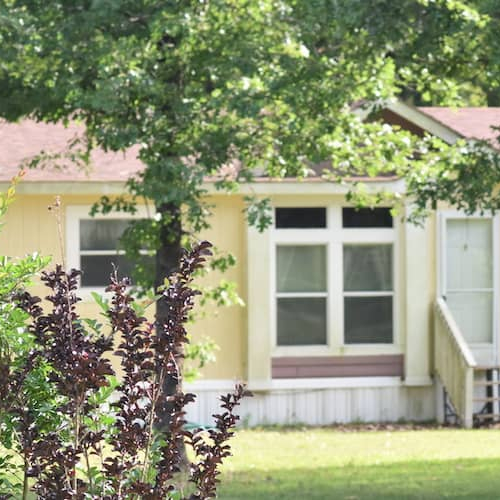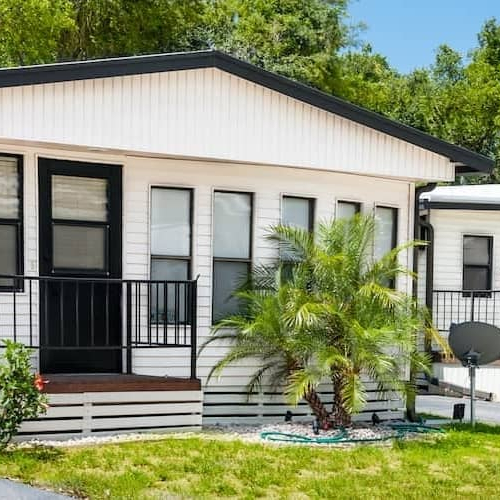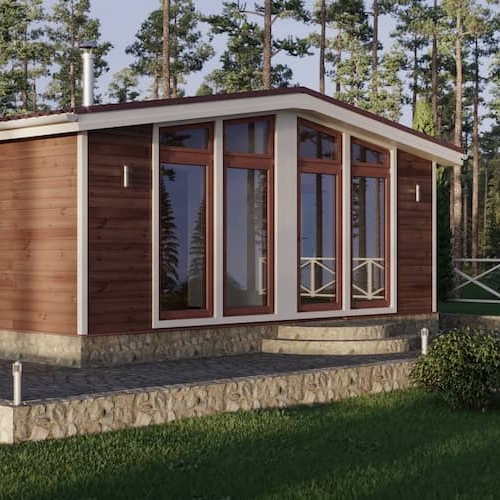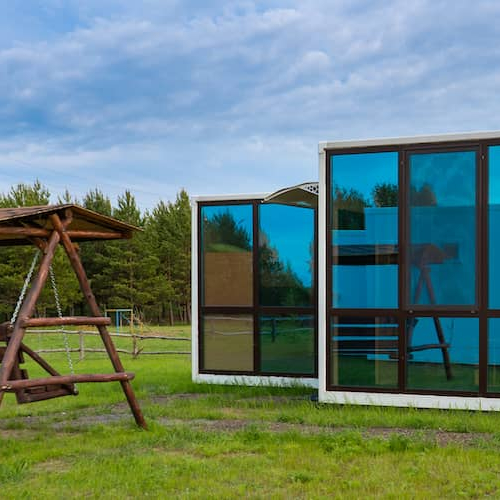The basics behind financing a mobile or manufactured home
Feb 19, 2024
•10-minute read

Effective November 16, 2025, both Fannie Mae and Freddie Mac are removing the minimum credit score requirement from their conventional loan eligibility guidelines. Loan approval will instead be based on an evaluation of overall credit risk factors.
House prices seem to be ever rising, making it harder for aspiring homeowners looking to put down roots. But what if there were a home available at a fraction of the price of traditional site-built housing? That would probably sound pretty good, right? That’s the allure of a mobile or manufactured home.
If you’re looking to buy one, you should be clued in on what to expect in terms of financing. Otherwise, you might get blindsided by the costs and process. We’ll compare loan options and discuss what sellers need to know to give buyers access to the best loan terms.
What are manufactured and mobile homes?
Mobile homes and manufactured homes are often seen as being one and the same. However, all manufactured homes built after June 15, 1976, have a HUD tag and data plate showcasing they meet the standards of the Department of Housing and Urban Development (HUD). Homes built before that date are often referred to as “mobile homes.”
Mobile homes, which predate June 15, 1976, weren't built with the same specifications for safety and durability in mind. In turn, financing options may be more limited.
Financing manufactured or mobile homes
The average cost of a manufactured home in the U.S. is $87,400. While it's affordable stacked against home prices, it's still a significant chunk of change. The good news is that financing is for manufactured homes is available, which include:
FHA
Backed by the Federal Housing Administration (FHA), FHA loans typically require a down payment as low as 3.5%. Designed for first-time home buyers, they feature low down payments, low closing costs, and less-stringent credit requirements.
To be eligible for a FHA loan for your manufactured home, you'll need to check off the criteria for FHA eligibility and underwriting standards. Plus, you'll need to occupy the home, and it needs to be your primary residence. Last, you'll need to have a suitable location or site for your manufactured home.
While the minimum credit score you need is 500, you'll qualify for the maximum amount of financing available with a score of 580. If your score is hovering between 500 and 579, you'll be available for up to 90% of loan-to-value (LTV).
Title I
Title I is a manufactured home loan program that is backed by the U.S. Department of Housing of Housing and Urban Development (HUD). It insures loans from private lenders that are made available for new or used manufactured homes.
While you don't need to own the lot your manufactured home is placed on, you'll need to have a lease that's good for at least 3 years. As of now, most you can borrow for a single-section home loan is $105,532 and $193,719 for a multisection home loan. For a home and lot, the cap borrowing amounts are $148,909 for a single-section and $237,096, respectively.
Once you're approved for a Title I manufactured home, you'll need to provide insurance premiums and an annual premium. The maximum length of the loan is up to 20 years and 32 days, to be exact.
VA loans
VA loans are backed by the U.S. Veterans Benefits Administration, and are available for active service members and veterans with an honorable discharge. VA loans feature no down payment requirements, fewer closing costs, and pretty low interest rates. Plus, there's no prepayment penalties and no need for private mortgage insurance (PMI).
Chattel loans
Chattel mortgages are mortgages for personal property not tied to land. This type of mortgage is typically used if you rent the land on which your property sits.
While not as high as a personal loan rate, chattel loan rates are still higher than home loans because it’s considered personal property. You can still keep your land if you default. There are also shorter loan terms, and you can’t borrow as much as you could with a regular mortgage.
Conventional loans
A conventional mortgage is likely the most attractive financing option if your home is on a permanent foundation. It also might be the most favorable route if your land and your home are tied together as real property.
You’ll be able to get a regular conventional mortgage rate, which features some of the lowest rates available. Additionally, you have the option of financing for up to 30 years if you choose. Finally, there are fixed and adjustable rates so there’s flexibility in terms of loan options.
When applying for a conventional mortgage to buy or refinance a manufactured home, there are qualifications for you as a client and for the property itself. Let’s touch on the personal qualifications first.
- Credit score: You’ll need a minimum qualifying FICO® Score of 620 or better.
- Debt-to-income ratio (DTI): DTI refers to the percentage of your gross income that’s used to make your minimum monthly debt payments. In general, it’s a good idea to keep your DTI at 43% or below to qualify for most mortgage options.
- Down payment or equity amount: Your down payment should typically be at least 5% if you want to purchase a manufactured home or do a rate/term refinance of your current loan. If you want to take cash out of the home, you’ll need to leave at least 35% equity in the home. If you’re taking cash out, the property cannot be a single-wide home and the maximum loan term is 20 years.
Beyond the personal financial requirements, there are a few restrictions on the home itself that we want to call out:
- Title: The title must show that both the land and the home itself have been tied together and converted to real property. We’ll have more on that below.
- Foundation: The home needs to be on a permanent foundation. The towing hitch, wheels and axles must be removed.
- Age of the home: To get a loan through Rocket Mortgage®, the home must have been manufactured on or after that golden date of June 15, 1976.
- Number of units: We’re lending on single-unit properties.
Rocket Mortgage offers conventional financing on qualifying manufactured homes. Rocket Mortgage doesn’t offer financing for manufactured or mobile homes built before June 15, 1976.
Fannie Mae
A government-backed enterprise, Fannie Mae has mortgages that are available for those who are looking into buying a manufactured home. To make homeownership more affordable, Fannie Mae has two programs for manufactured homes.
The first is what's known as manufactured home advantage (MH Advantage), which features a down payment that's as low as 3%. It also offers flexible sources for your down payment, such as funds from multiple sources.
Another selling point for a home loan from Fannie Mae is that financing is available for up to 30 years, and lower interest rates may be available compared to other manufactured home options. Once you've built 20% equity in your manufactured home, you can drop private mortgage insurance.
The standard manufactured housing financing available through Fannie requires a 5% down payment and a minimum credit score of 620. You can also cancel mortgage insurance once you've hit 20% equity in your home.
Freddie Mac
Through Freddie Mac's CHOICEHome® Program, you can secure a manufactured home loan with as low as a 3% down payment. These are geared toward multisectional manufactured homes that are at least 1,000 square feet, and your primary residence.
As far as credit requirements go, you'll also need a minimum credit score of 680. Your credit history in the last 24 months needs to show no unpaid judgements, tax liens or collections, no payments 60 days or more past due, and no other housing payments past due.
Personal loans
A personal loan can be a solid option for financing a manufactured home. While you don't need a down payment to secure a personal loan, the loan limits might be lower than other types of financing available. Usually, personal loan amounts are up to $50,000, and some lenders might have available loan amounts up to $100,000.
On the upside, personal loans can be used for a variety of purposes, including home renovations or to cover an emergency repair. The application process can be done online and can be quicker and less involved than taking out a home loan. That said, personal loans may have higher interest rates than home loans.
Currently, the average interest rate for a 24-month personal loan is 12.32%. The current rate for a 15-year fixed rate mortgage is 6.09% and the rate for a 30-month fixed mortgage is 6.87%. A personal loan is an unsecured loan, meaning that if you don’t pay it back, there’s nothing a lender can take as collateral.
Because there’s nothing to back up the loan other than underwriting checks on your creditworthiness, interest rates for these loans tend to be higher. The size of the loan you can get is also comparatively smaller and terms are typically anywhere from 2 – 7 years.
Manufactured home benefits
The big benefits to purchasing a manufactured home are enhanced affordability when compared with stick-built homes (aka homes built on-site using traditional wood-framing techniques) to go along with rigorous federally mandated construction standards. Construction is also much faster.
More affordable
Building in a factory with standardized blueprints and materials leads to numerous cost and operational efficiencies that make manufactured homes more affordable compared to homes that are constructed on-site.
According to the Manufactured Housing Institute, the average cost of a manufactured home before accounting for land was $108,100, compared to $365,904 for a site-built home. In terms of cost per square foot, the price is almost cut in half. For a site-built home, you’re looking at $143.83 per square foot compared to $72.21 for the average manufactured home.
The combination of smaller loan sizes enabled by the affordability of manufactured homes and the lower rates available under a conventional mortgage mean more people will be able to afford a home. Homeownership is one of the biggest predictors of the ability to pass on generational wealth.
Safe and durable
Since 1976, manufactured homes need to adhere to federal HUD code. These are national standards regarding home design and construction, strength and durability, and resistance to fire and energy efficiency.
In homes built since the early 1990s, improved standards around energy and ventilation have been in place along with wind resistance standards to mitigate hurricane damage.
Further, manufactured homes use the same construction materials as homes built on site. There are also safety regulations around where combustible materials are placed, and smoke detectors are required. The construction process is continually inspected.
Stick-built homes are constructed up to local code, which can vary widely based on your location. With a manufactured home, there is one standard, and you know what you’re getting.
Faster builds
One of the pluses to building in a factory is the boosted efficiency it brings to the construction process. The factory environment enables assembly-line manufacturing as well as a controlled environment. You don’t end up with weather delays. Plus, building materials are also not damaged and you get a labor force that's highly trained in their portion of the job.
What sellers need to know
If you’re a seller, making your home compliant with the requirements to get a traditional conventional mortgage is to your advantage. Because it enables buyers to receive financing on much more attractive terms, doing so could greatly increase your pool for potential offers. Here are four things you should confirm prior to selling:
- Is it real property? For buyers to finance their purchase with a traditional mortgage, the home has to be real property. This means that it’s permanently affixed to the land and the land and home are taxed together. You should be able to see this based on the title.
- Is there an outstanding vehicle title? It’s often the case that manufactured homes begin their life treated as a vehicle for title purposes. Not every state requires that a vehicle title is surrendered to convert the home to real property. However, when you go to sell, working through this can mean additional time and fees. If the vehicle title is in the seller’s name alone, we recommend surrendering it in advance to avoid these issues.
- Do you have the data plate and HUD certificates? If either of these are missing or damaged, it will be necessary for the lender and appraiser to receive letters from the Institute for Building Technology Safety. These serve as evidence that the home passed initial HUD inspection. If you have to order the letters, there’s a cost and it can take up to 2 weeks to get them. Having the information available in advance can help avoid delays.
- Has there been an addition to the home? If there has, you’ll need evidence of a structural inspection by the county or someone the county approves. It doesn’t matter whether the inspection is done at the time of the addition or at some point thereafter, but this is necessary to confirm the home can handle the load put on by the addition.
Although, up to this point, we’ve been speaking about making sure you’re ready to sell your home, you’ll need to satisfy all the same requirements to refinance your current loan into a conventional mortgage.
Get your insurance in order
One of the important things you need not only to get a mortgage but to protect your investment is homeowners insurance. However, the industry isn’t always set up with owners of manufactured homes in mind.
Our sister company CoverTree has a homeowners insurance offering that’s built from the ground up for manufactured homes. It’s also fully digital, so forget the fax machine, tedious paperwork and waiting on hold.
You can get a quote online and save up to 40% in 3 minutes. They can help protect your home, other structures and your belongings. They also offer personal liability and loss of use coverage, all at a fair price that won’t break your wallet. If you do have a claim, you’ll get support from their U.S.-based team.
The bottom line: Options for financing a manufactured home
Manufactured homes are built to HUD standards and entirely in a factory before being transported to the land on which they’ll sit. In other words, this means you have one set of safety regulations and it can be built using an assembly-line method. Homes can be built much faster this way and more affordably while still often being indistinguishable from stick-built homes.
If you’re interested in buying or refinancing a manufactured home, you can apply online or give us a ring at (833) 326-6018.
Kevin Graham
Kevin Graham is a Senior Writer for Rocket. He specializes in mortgage qualification, economics and personal finance topics. Kevin has passed the MLO SAFE exam given to mortgage bankers and takes continuing education courses. As someone with cerebral palsy spastic quadriplegia that requires the use of a wheelchair, he also takes on articles around modifying your home for physical challenges and smart home tech. He has a BA in Journalism from Oakland University.
Related resources

9-minute read
Manufactured homes: Defined and explained
Manufactured homes are made, piece by piece, within factories, then assembled on-site. Here’s how much they cost and what you should know before you buy o...
Read more

6-minute read
Modular vs. manufactured homes: What's the difference?
Modular and manufactured homes are both factory-built, but they have some key differences. Uncover the distinctions between modular and manufactured homes.
Read more

5-minute read
What is a prefab home?
Read more